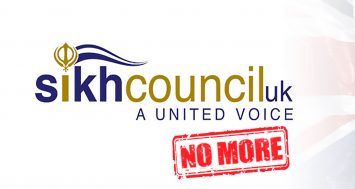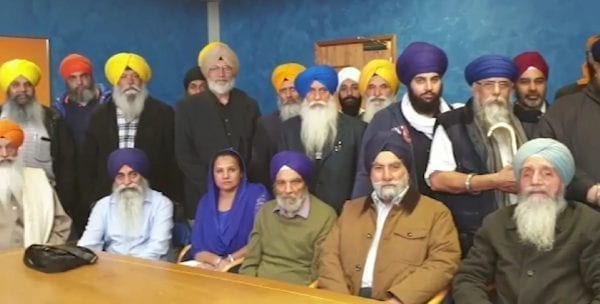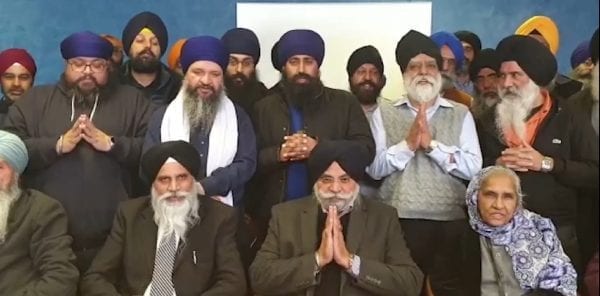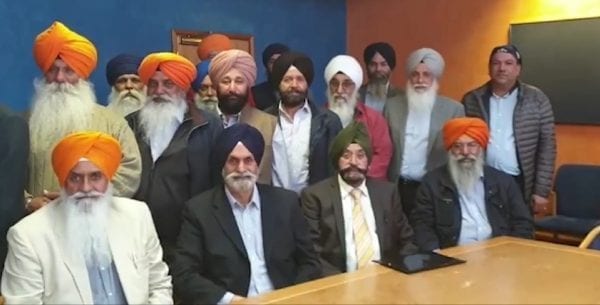

 LONDON, UK—Sikhs in the UK are left without a united voice after 68 delegates resigned before the Sikh Council UK’s General Assembly meeting last weekend.
LONDON, UK—Sikhs in the UK are left without a united voice after 68 delegates resigned before the Sikh Council UK’s General Assembly meeting last weekend.
Allegations of a takeover by a rival group, Sikh Federation UK, is most prevalent among what is being discussed over social media. These allegations, although dismissed by Sikh Federation UK, have been rife over the past few weeks and some of those who have resigned have broken their silence.
In a statement seen by Sikh24 issued from amongst the 68 members that have left Sikh Council UK, the resigning members have said the Sikh Council UK is no longer a collective and representative voice of Gurdwaras and Sikh organisations. The former members who resigned last week represent some of the largest Gurdwaras and Sikh organisations across the country.
Has Sikh Federation UK taken over Sikh Council UK?
The resigning members have alleged Sikh Council UK has effectively been taken over by the Sikh Federation UK and said many of the top posts in the new Executive Committee of Sikh Council UK announced at the General Assembly meeting at Sri Guru Singh Sabha Gurdwara Southall on Saturday 27th April have been given to members or supporters of Sikh Federation UK.
The resignation letter states – “This is a decision we have reached with a heavy heart and after several months of attempting to reach a resolution on a way forward for the Sikh Council UK following the last six months of turmoil. We have repeatedly raised our concerns and attempted to pursue dialogue with you but unfortunately all our efforts have remained fruitless with some of the Board of Jathedars point blank refusing to meet with members of the Sikh Council UK Executive Committee in recent weeks.”
Sikh Federation UK, however, rebutted these allegations. “The Sikh Federation (UK) is a large national organisation that has more than 20 branches across the UK with local and national leadership. We therefore have extensive links to Gurdwaras with local members and supporters involved in voluntary work (seva) in over 100 Gurdwaras,” Sikh Federation UK representative Jasvir Kaur told Sikh24.
Undertones of sexism by those in power
However, there is more to the allegations than just a takeover by those affiliated with the Sikh Federation UK as revealed by a letter signed by the 68 members of the Sikh Council who resigned last week.
At an Executive Committee meeting of the Sikh Council UK on 23rd March at Guru Nanak Gurdwara in Willenhall, in the presence of the Board of Jathedars, which consists only of men, the Executive Committee decided to implement its constitutional power and remove Dabinderjit Singh and Baldev Singh Bains as joint Secretary Generals following what has been termed as a ‘controversial’ letter they had sent to Government Ministers on behalf of Sikh Council UK.
A source close to Sikh Council UK told Sikh24.com: “They had gone outside their remit and were defending the position of the Sikh Federation UK in their letter to the Government, which differed from what Sikh Council UK wanted to achieve in regards to the Offensive Weapons Act. The Board of Jathedars said that both would be investigated, but everyone knew that that was unlikely to happen.”
The Executive Committee then unanimously proposed its first woman leader in Bibi Paramjit Kaur Matharu as the new Secretary General. Jagtar Singh, the third joint Secretary General at the time, and of the previous administration, voluntarily agreed to step down to make way for the first woman leader. They decided in the interest of transparency that a meeting of the wider executive would be called on 27th April where the proposal would be agreed in unity with everyone.
Sikh24 further told that “some of the Board of Jathedars present at the meeting members got angry and aggressive at the decision to remove the existing Secretary Generals and proposing a woman leader. It was a very nasty situation to be in if you were a woman; seeing some of the elders telling everyone it was their way only and basically making clear a woman couldn’t be selected as a leader by the Executive Committee. Other Board of Jathedars agreed it was our right to make the decision under the constitution, so there was a clear conflict between them as well. We’ve never had a woman leader of a major Sikh organisation and this felt like another example of men not being able to accept women can do more than just help, they can lead.”
The source went on to say “There are less women in the new Executive Committee announced by the Sikh Council UK on 27th April than even the previous Committee. There has never been a female senior office bearer in Sikh Council UK in nearly a decade since the inception of the organisation back in 2010″.
Chaos as New Election Process Is Used to Elect New Members
Newly elected members of the Sikh Council UK
The Board of Jathedars responded to the decision of the Executive Committee by announcing they were dissolving the entire Executive Committee interim structure and set up a new process for selection which would involve a ‘parchi’ system, which has been described as pulling names out randomly. The resigning members described this decision as “unconstitutional” and allege the Board of Jathedars had no power to make this decision.
We have learnt from sources that some of the Board of Jathedars did not agree with all that announced in their name and they called for the General Assembly meeting to be cancelled and did not attend the General Assembly meeting called in Southall. The Board of Jathedars who wanted to use the ‘parchi’ system said that process of drawing the ‘parchia’ would in the Darbar Hall in the presence of Sri Guru Granth Sahib and the first ‘parchi’ drawn would be accepted and respected as the ‘Guru’s wish’.
The sources disclosed that the Board of Jathedars members who attended the meeting failed to follow their own process. The meeting actually took place in a meeting room instead of the Darbar Hall, therefore not in the presence of Sri Guru Granth Sahib Ji, and that there was chopping and changing of some of the names of those whose ‘parchia’ were initially picked out not taking up the roles including for the role of the Secretary General.
In response to an email sent by Sikh, Sikh Federation UK stated that the resignation letter was sent shortly before the General Assembly meeting and shared with “a controversial anti-Panthik journalist to publish” in order to “damage the Sikh Council UK” but that it had had the “opposite effect”. Sikh Federation UK said “some” members had resigned to “hide their own failings and avoid disciplinary action”.
In response to the question of whether the office bearers were selected in the presence of Sri Guru Granth Sahib Ji, Sikh Federation UK responded that “all faith was placed in Guru Maharaj” and that it was “fair to say the 5th Administration of the Sikh Council UK was selected by Guru Sahib Ji.”
On claims that Sikh Federation UK had taken over Sikh Council UK they said the “allegation against the Sikh Federation (UK) of too much influence prior to the parchia system of selection makes absolutely no sense.” Sikh Federation UK stated that “Mangal Singh was the only Sikh Federation (UK) delegate who was selected in one of the 15 key roles as the Chair of the Indian sub-continent subcommittee. However, he had the humility to step back and allow Gurmail Singh Malhi to take on that role and he became his assistant. The only other Sikh Federation (UK) delegate selected via the parchia system was Narinderjit Singh Thandi who is an ordinary member of the 30-member Executive.”
What does the future hold?
Sikh Council UK’s moto is “a united voice” but the mass resignations make it apparent that the organisation is no longer a uniting force for the Sikh community of the UK. It appears to have become a shell of its former self and now just another organisation. The organisation’s fall from grace is a great shame for those who shared a vision for a common place to bring the Sikh community together in the UK in the pursuit of the key common goals and objectives. What is for sure, Sikh Council UK no longer represents a united voice for Sikhs in the UK.








There are always two sides to any story. It is unfortunate that this article is not balanced at all.
In terms of background on the governance of SCUK. There is a General Assembly (GA), which consists of all members of SCUK. The GA selects an Executive committee (EC) of 30, to serve for 2 years. The selected EC then selects the Office Bearers, Assistants and Chairs of sub-committees, As well as coopting 21 more members to make the full EC. However this year the selected EC, after 2 meetings could not agree on the selection of Office Bearers. The EC then collectively agreed to pass on the selection process of the office bearers to the Board of Jathedars (BOJ ,as has been done in the past), without any conditions. The SCUK constitution also stipulates that if there are any internal disputes the BOJ are empowered to resolve them.
The BOJ, sensing conflict within the EC, as they were unable to select the Office Bearers, to avoid any further conflict selected not only the Office bearers but also their Assistants and other positions. These were conveyed not only to the selected EC, but also the GA members. Only a minority of EC members objected and started writing openly against the decision of the BOJ, without having the courtesy to first write to the BOJ expressing their concerns.
Those selected into the positions, known as the leadership team, had a meeting and agreed to call a meeting of the selected EC members at which the BOJ would be invited to explain their rationale for their selections and an opportunity for EC members to raise any issues of concern. Unfortunately one of the Joint Secretary Generals, who was not at the leadership team meeting, decided to invite people that were not in the selected EC, despite protests from some. Thus, to avoid any conflict, some EC members wrote to the BOJ, to say they would not attend the EC meeting, as they had no issues with those selected by them.
At this meeting of only 12 selected members of the EC and some not in the EC, despite being told by the BOJ members that would look into the issues raised and not to make any rash decisions, decided to remove the joint Secreatry Generals, thus again undermining the BOJ.
Using the governance structure and constiutional powers, the BOJ, decided that after being undermined, the only choice they had was to dissolve the EC and call a meeting of the General Assembly. As there was a dispute between all on the way forward, they agreed to use the traditional gurmat approach of using a parchia system to select the new EC. All GA members were sent communications to this effect and had the opportunity to put forward their ‘parchia’. It is unfortunate that some did not have faith in this traditional approach that has been used many times by the panth.
Sukhvinder Singh Padda
EC member since inception of SCUK, former Chair of Strategy and Policy and member of team that drafted the Constitution
We do not have a united front only a few people have always taken decisions Federation is run by anti Sikh elements decisions always taken behind closed doors Sikh federation is owned by five people and they have never changed all they do is collect money for their benefits very sad no one speaks up
Bhai Gurmit Singh
Can you please provide any evidence to substantiate your claims against the Sikh Federation. You have made a serious allegation against individual associated with SFUK of committing Fraud.
Sukhvinder Singh (UK)
This article needs much better balance. Too much credibility has been given to an unsigned letter to which a list of names is appended. The letter was leaked to the press just before the General Assembly of the Sikh Council UK on 27 April. The authenticity should have been checked with at least some of the gurdwaras and organisations concerned. These are obvious question a journalist would ask and seek the views of those named in the article. Otherwise, there is a risk of defamation.
I have gained the impression that the Sikh Council UK’s role has not been understood in recent years and so the forum has run into difficulties. Ideally, the Council is a nationwide assembly of Gurdwaras and organisations. It is not an organisation or a jathebandi and should not behave like one competing with established organisations. It is more akin to UK-wide Sarbat Khalsa. It has a secretariat to provide office services and to carry out the wishes of the General Assembly.
Otherwise, no one in the administration, especially the Secretary General, has any unilateral “power” but only that which derives from team-working and through collective decisions All office holders should solemnly undertake to consult at least each other and work in an open and accountable manner. From the events of the last few months, I sense that the above was either ignored or not understood and there was hardly any succession planning for smooth and timely transition to the next administration.
Let us hope the Council is brought back to its intended umbrella role. The need for such a nationwider body is there.